New Monastic Library: Resources for Radical Discipleship (10 vols.)
Digital Logos Edition
Overview
For over a millennium, if a Christian wanted to read theology, practice Christian spirituality, or study the Bible, he or she went to a monastery to do so. There, people who inhabited the tradition and prayed the prayers of the church also copied manuscripts and offered fresh reflections about living the Gospel in a new time. Two thousand years after the birth of the church, there is a new monastic movement stirring in North America. In keeping with ancient tradition, new monastics study the classics of Christian reflection and are beginning to offer some reflections for a new time. The New Monastic Library exists to share reflections from new monastics and to provide classic monastic resources unavailable elsewhere.
With the Logos Bible Software edition of the New Monastic Library: Resources for Radical Discipleship, you have unprecedented access to resources that offer relatable and insightful material for your study. You can do hours of biblical research with a click. With powerful searching by topic or Bible passage, instantly viewable Scripture references, a vast library of resources, and much more, Logos is the perfect software to expand your understanding of Christian monasticism, St. Benedict’s monastic rules, and living in community.
This title is included in the following collections
You can save when you purchase this product as part of a collection.
Logos 7 Pentecostal & Charisma...
$849.99$849.99Logos 8 Pentecostal & Charisma...
$1,499.99$1,499.99Logos 9 Pentecostal & Charisma...
$1,499.99$1,499.99Logos 8 Pentecostal & Charisma...
$2,999.99$2,999.99
- $2,999.99
- $4,749.99
- $11,593.84$8,499.99
- $21,749.99
- $24,999.99

- Provides reflections from monastic communities in the USA, Australia, Canada, and New Zealand
- Analyzes what it means to live in contemporary Christian community
- Emphasizes the importance of living an intentional Christian life
- Analyzes Benedictine monasticism and Thomas Merton’s views on technology, war, and consumerism
- Equips pastors to plant, lead, and grow neomonastic communities
John Alexander has been one of the unsung heroes in the modern Christian world. His understanding of Christianity as a counter-cultural movement is profound, and he has been able to communicate it with effectiveness in his writings. Everything he has written has been marked by fresh insights into what it means to be a Christian in a society in which cultural Christianity has become the norm.
—Tony Campolo, emeritus professor of sociology, Eastern University
Superb. Disturbing. Challenging. Radical because it is biblical. Being Church is an extremely well-written, theologically profound but easily understood presentation of a hugely important truth: almost everything depends on recovering the revolutionary reality of genuine Christian community. A must-read.
—Ronald J. Sider, distinguished professor of theology, holistic ministry, and public policy, Palmer Theological Seminary
Being Church is a comprehensive and winsome invitation to embrace a more radical and holistic vision for the church. It is also a testament to the remarkable story of Church of the Sojourners. John’s voice has the weight of wisdom that comes only from deep reflection and hard-earned experience—it is a voice that we should pay attention to.
—Mark Scandrette, founding director, ReIMAGINE
It took a 60-year journey before John Alexander could write this book. Eventually he learned that trying harder and doing more is not the way God changes us. Nor is it the good news of the gospel for the world. This book shares the alternative: the culture of grace. It was worth the wait.
—Chris Rice, founding codirector, Center for Reconciliation, Duke Divinity School
- Title: New Monastic Library: Resources for Radical Discipleship
- Editor: Jonathan Wilson-Hartgrove
- Publisher: Wipf & Stock
- Volumes: 10
- Pages: 1,826
- Christian Group: Evangelical
- Resource Type: Topical
- Topic: Christian Living
- School(s) for Conversion: 12 Marks of a New Monasticism edited by The Rutba House
- Inhabiting the Church: Biblical Wisdom for a New Monasticism by Jon R. Stock, Tim Otto, and Jonathan Wilson-Hartgrove
- Community of the Transfiguration: The Journey of a New Monastic Community by Paul R. Dekar
- “Follow Me”: A History of Christian Intentionality by Ivan J. Kauffman
- Longing for Spring: A New Vision for Wesleyan Community by Elaine A. Heath and Scott T. Kisker
- Living Faithfully in a Fragmented World: From ‘After Virtue’ to a New Monasticism, 2nd ed. by Jonathan R. Wilson
- Plunging into the Kingdom Way: Practicing the Shared Strokes of Community, Hospitality, Justice, and Confession by Tim Dickau
- Against the Tide, Towards the Kingdom by Jenny Duckworth and Justin Duckworth
- Thomas Merton: Twentieth-Century Wisdom for Twenty-First-Century Living by Paul R. Dekar
- Being Church: Reflections on How to Live as the People of God by John F. Alexander
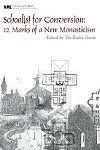
Throughout the history of the church, monastic movements have emerged to explore new ways of life in the abandoned places of society. School(s) for Conversion is a communal attempt to discern the marks of a new monasticism in the inner-cities and forgotten landscapes of the empire that is called America.
By combining first-person accounts of the marks of Christ-formed communities with rich historical and biblical reflection, the various writers provide truthful and hope-filled descriptions of contemporary Christian community. Taking seriously the resources of the monastic tradition and the importance of preserving a relationship with the wider church, the authors offer mature, wise, and gracious insight into the practices of faithful living. I heartily recommend this book to anyone yearning for evidence and promise of renewal in the church!
—Christine D. Pohl, professor of church in society, Asbury Theological Seminary
Whatever future God has for the church, I am convinced the essays in this remarkable book will help us discern that future. Monasticism has always been one of the main means God has used to renew the church. Through some strange miracle God now seems to be calling Protestants to consider what it might mean for them to live in communities that might look very much like monastic communities. Such a call might tempt many toward some kind of romanticism, but one of the remarkable things about these essays is their stark realism. Such a realism is unavoidable not only because of the challenges facing those who are about the formation of communities faithful to God but also because they have lived with one another enough to know this is not going to be easy. So these essays are full of good sense and they help us see the potential of this extraordinary movement. Moreover, each essayist never forgets to remind us that when it’s all said and done, it’s about God who makes it possible for us to live patiently and nonviolently in a world of impatience and violence.
—Stanley Hauerwas, Gilbert T. Rowe Professor of Theological Ethics, Duke Divinity School
I believe the new monasticism represents a source of vital renewal from the margins and forgotten places of empire. It is my sincere hope that the new monasticism will grow so strong and healthy and widespread that every follower of Jesus in every church has the opportunity—if not to actually live in a new monastic community—to at least have enough proximity and relationship to be influenced by it. This book can help that dream and prayer come true.
—Brian McLaren, pastor, Cedar Ridge Community Church, Spencerville, MD
In this vision of transformation, the prophets of a new monasticism have a single commitment. They want to realize together—in prayer, thought, and action—their total dependence on God by simply following Jesus. A book prompted by our civilization’s signs of death may not seem hopeful, but this one is. The new monasticism has seen the truth that in deepening darkness there is nothing so hopeful as embracing the cross.
—Jim Douglass, cofounder, Ground Zero Center for Nonviolent Action, Poulsbo, WA
God is stirring something new . . . a new monasticism. This book will take you on an intriguing journey with a few followers of Jesus who are discovering some new ways to give expression to the monastic vocation in our troubled world. Must reading for those who want to take their faith seriously in community with others.
—Tom Sine, founder, Mustard Seed Associates
The Rutba House is a Christian community of hospitality, peacemaking, and discipleship in the Walltown neighborhood of Durham, NC. It provides formerly homeless people a place to eat, pray, and share their lives.
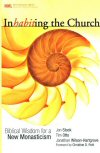
If the church is more than just a building, what could it mean to live in it—to inhabit it as a way of life? From their location in new monastic communities, Otto, Stock, and Wilson-Hartgrove ask what the church can learn from St. Benedict’s vows of conversion, obedience, and stability about how to live as the people of God in the world. In storytelling and serious engagement with Scripture, old wisdom breathes life into a new monasticism. But, like all monastic wisdom, these reflections are not just for monks. They speak directly to the challenge of being the church in America today and the good news Christ offers for the whole world.
Conversations between contemporary Christian communities and Benedictine monasticism are among the most surprising and promising in the church today. Given that the roots of monasticism and of contemporary Protestantism lie in different parts of the Christian tradition, mutual engagement between contemporary Christians and monastics has been rare. Recently, however, the scene has shifted, and Inhabiting the Church represents the new eagerness to learn the art of living together faithfully from experienced and ancient practitioners.
—Christine D. Pohl, from the Foreword
Protestants looking for a richer, thicker, more robust, and enchanted way of living into the Christian story should not ignore this invitation into the rhythms and cadences of Benedictine spirituality. Indeed, only one kind of person should avoid this book: the reader who does not wish to be changed.
—Lauren F. Winner, assistant professor of Christian spirituality, Duke Divinity School
This book is a timely intersection of the new and ancient, breathing fresh life into an aging body. An older generation will find this book a long-awaited reassurance that the Spirit is still stirring radical nonconformity on the margins of empires. And the contemporary renewal of new monastics and prophetic tricksters will find a cure for the pretension and sloppiness that can so often taint our vision or tempt us to pretend that there is ‘something new under the sun.’ With both courage and humility, we will all find ourselves invited to inhabit the incarnational body that makes God visible to the world . . . May it inspire all of us to become the church that God longs for.
—Shane Claiborne, founding member, The Simple Way
These folks are bringing things both old and new out of the great Christian storehouse! The New Monasticism is discovering what is always rediscovered—and always bears great life for the Gospel.
—Richard Rohr, founder, Center for Action and Contemplation
Jon Stock is a member of Church of the Servant King, publisher of Wipf & Stock, and proprietor of Windows Booksellers in Eugene, Oregon.
Tim Otto serves as an associate pastor of the Church of the Sojourners in San Francisco. He is also a part-time nurse at the San Francisco county hospital, working with AIDS and cancer patients.
Jonathan Wilson-Hartgrove is a speaker and spiritual writer. He lives with his wife, Leah, and other friends at the Rutba House, a new monastic community of hospitality, peacemaking, and discipleship that he founded in Durham, North Carolina.
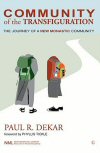
In the 1930s, German theologian Dietrich Bonhoeffer anticipated the restoration of the church after World War II through a new kind of monasticism, a way of life of uncompromising adherence to the Sermon on the Mount in imitation of Christ. Since then, the renewal of Christian monasticism has become a great spiritual movement. Imbued with a love for God and neighbor, and with a healthy self-love, people are going to monasteries to deepen their relationship with God, to pray, and to find peace. While some monastic institutions are suffering a decline in traditional vocations, many Christians are exploring monastic lifestyles. This book introduces The Community of the Transfiguration in Australia, the story of a new monastic community and an inspiring source of hope for the world at another time of spiritual, social, and ecological crisis.
Western civilization was cradled by the monastic movements of the Middle Ages, and many of the discoveries of modern science have their roots in monastic gardens and infirmaries. Paul Dekar gives a glimpse into a Christian movement of our time that promises to provide new energies—from the heart of evangelical Christianity—to enliven the monastic ideal and provide a unique Christian witness to the world. Intentional Christianity, a more intense form of belief and practice, provides all Christians, and indeed all persons, with a window into the possibilities of the gospel of Jesus Christ and the prospect of a world remade.
—Jeffrey Gros, distinguished professor of ecumenical and historical theology, Memphis Theological Seminary
The Community of the Transfiguration at Breakwater, Victoria, is one of the hidden and unexpected gems of the contemporary Australian Christian scene. Quietly but purposefully it has grown over the past 25 years into a vibrant, Spirit-filled Christian community standing in the great tradition of Christian monasticism. What is unexpected but all the more exciting is that this community is firmly grounded in and embraced by the Baptist Church while at the same time being thoroughly ecumenical. Paul Dekar’s book is a most timely contextualization of and tribute to the community.
—Andrew St. John, rector, Church of the Transfiguration, New York
Paul R. Dekar is Niswonger Professor of Evangelism and Missions, Memphis Theological Seminary. He is author of Creating the Beloved Community: A History of the Fellowship of Reconciliation in the United States and Holy Boldness: Practices of an Evangelistic Lifestyle. He and his wife Nancy are North American members of Holy Transfiguration Monastery in Australia.
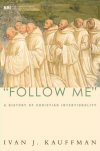
From the very beginning there have been Christians who wanted to go all the way—who, rather than asking, “What must I do to be a Christian?” asked instead, “What can I do to be more Christian?” These highly intentional Christians have had an impact on the development of both Christianity and Western civilization that has been completely out of proportion to their numbers.
The greatest impact of these Christians has come through the communities of like-minded believers—some lay evangelicals and others of celibate monastics—formed based upon their common desire to live more intentional Christian lives. Throughout the past 20 centuries, hundreds of groups of both kinds have formed.
This probing work tells the story of these communities, both monastic and lay. It is a story that, though often overlooked, is both inspiring and instructive. Above all it is a story that opens the way for greater understanding between two groups of Christians who have long been estranged—Protestant evangelicals and Catholic monastics.
Evangelicals are often accused of being ahistorical because we jump from Paul to Martin Luther without a pause to consider what the Spirit did in between. But every Christian tradition finds some way to draw the line from Jesus to the present. How we tell that story shapes who we are. ‘Follow Me’ tells the Christian story in a way that sparks my imagination and gets me excited about who the church is becoming in our post-Christian era. I hope every community of disciples will read it and ask, ‘How is God calling us to live the next chapter?’
—Jonathan Wilson-Hartgrove, founder, Rutba House
Kauffman offers us a first installment on the kind of scholarship becoming possible thanks to the stereoscopic perspective of those who are learning to live on both sides of a great river that has long divided Christianity. . . . Unexpected though the news may be, it is the very burden of Kauffman’s book to show us why we should not have been surprised, and would not be surprised, if we read the history of Christianity looking for its broadest unifying patterns rather than for the basis of our separate identities. . . . He has done a service to historian, ecumenist, and renewal-minded Christian alike by looking for the forest not just the trees, surveying the lay of the land, and marking the river that gives it life.
—Gerald W. Schlabach, professor of theology, University of St. Thomas
Ivan J. Kauffman grew up in one of the oldest surviving lay evangelical communities, the Amish Mennonites. Educated as both a Mennonite and a Catholic, he has been active in Mennonite Catholic dialogues from their beginnings in the 1980s, and was a founder of the North American grassroots Mennonite Catholic dialogue, Bridgefolk, which meets regularly at Saint John’s Abbey, Collegeville, MN. He identifies as a Mennonite Catholic.
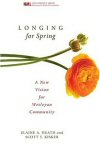
Delving into the widespread, contemporary longing for a more serious and communal experience of Christianity, this book provides important theoretical underpinnings and casts a vision for a new monasticism within the Wesleyan tradition. Elaine Heath and Scott Kisker call for the planting of neo-monastic churches which embody the Wesleyan vision of holiness in postmodern contexts. This book also points toward some vital shifts that are necessary in theological education in order to equip pastors to lead such communities. Longing for Spring helps Wesleyans of all stripes understand the theory and praxis necessary for planting neo-monastic communities as a new model of the church that is particularly important in the postmodern context. The authors write in an engaging, conversational style that is conversant with postmodern culture, yet thoroughly informed by critical research. Heath and Kisker boldly challenge the imagination of the church—both within and beyond Wesleyan traditions—to consider the possibility of revitalizing the church through the new monasticism.
Welcome to the world of New Methodism, exciting evidence of the work of the Holy Spirit in the church today. New Methodism comes to us with contributions from the New Monasticism, John Wesley, Jonathan Wilson-Hargrove, and an emerging generation who are leading us to a fresh appreciation of what God intends the church to be. This is a wonderful book that quickly gives the theological rationale for a reformed church and then gives practical advice on how to grow to be a new church. This is exciting!
—Will Willimon, bishop, North Alabama Conference, United Methodist Church
Longing for Spring connects United Methodism with a historical and theological approach that is very accessible, not to mention inspirational. I read it on an airplane and people around me wondered what I was reading because the authors’ writing is so delightful at times that I was laughing out loud! I can’t wait to make my first appointment of a clergy to a monastic community.
—Sally Dyck, resident bishop, Northern Illinois Conference, United Methodist Church
Elaine and Scott are the best of guides for hungry Methodists. Their description of Wesleyan renewal is inviting. Their prescription for transformation is possible. I will be using this book in my class, our neighborhood and our congregation. What a blessing!
—Amy Laura Hall, associate professor of Christian ethics, Duke University
Elaine A. Heath is McCreless Associate Professor of Evangelism in the Perkins School of Theology at Southern Methodist University in Dallas, Texas. She is the author of The Mystic Way of Evangelism and coauthor of More Light on the Path: Daily Scripture Readings in Hebrew and Greek.
Scott Kisker is a professor of history of Christianity at Wesley Theological Seminary, and is the author of Foundation for Revival.
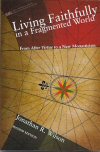
The first edition of Living Faithfully in a Fragmented World became one of the founding and guiding texts for new monastic communities. In this revised edition, Jonathan Wilson focuses more directly on lessons for these communities from Alasdair MacIntyre’s After Virtue. In the midst of the unsettling cultural shifts from modernity to postmodernity, a new monastic movement arises that strives to be a faithful witness to the gospel. These new monastic communities seek to participate in Christ’s life in the world and bear witness by learning to live intentionally as the church in Western culture. This movement is about finding the church’s center in Christ in the midst of a fragmented world, overcoming the failure of the Enlightenment project and our complicity with it, resisting the temptation to Nietzschean power, and building communities of disciples. This new edition is greatly enlarged from the original volume. It includes
- Responses to critics of the new monasticism such as D.A. Carson
- An entirely new chapter on the Nietzschean temptation
- An afterword on properly understanding the new monastic movement, the dangers it faces, and the work yet to be done
- An appendix on the supposed post-modern agenda of Jonathan Wilson and Brian McLaren
For those striving to understand the path the church should take in this fragmented world, this book is essential reading.
Jonathan R. Wilson is Pioneer McDonald Professor of Theology at Carey Theological College, Vancouver, BC. His most recent book is Why Church Matters.
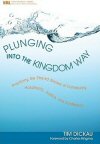
What practices might a community of faith take up that will bear witness to the alternative world Jesus envisions and calls us towards? That is the question that Grandview Calvary Baptist Church, an initially small and fragile group of Christ followers, has kept asking over the last 20 years. Along the way, this small group has spawned a vibrant community of faith that has traveled along four trajectories towards a shared life in community, radical hospitality, justice for the least, and confession leading to transformation. In a culture where individualism, consumerism, injustice, and autonomy shape us all, these practices have reshaped not only the people of this church but also the neighborhood they inhabit in the East side of Vancouver, British Columbia.
For anyone wanting to recover ancient but newly shaped practices of the first disciples, Plunging into the Kingdom Way offers renewed hope. By relating their story in conversation with a host of theologians, sociologists, and philosophers, Tim Dickau sparks the imagination for how you and your friends, your community, and your church can live out the radical vision of Jesus in your neighborhood today. Plunge in and you will discover renewed hope that you can actually follow the way of Jesus today.
. . . a deeply compelling and engaging portrait of a community that practices hospitality and justice while nurturing a strong spiritual and communal life. Tim Dickau’s careful description of a single congregation gives his readers excellent resources for imagining what a fuller commitment to a Kingdom way might look like in their own contexts.
—Christine D. Pohl, professor of church in society, Asbury Theological Seminary
It is one thing to ‘talk the talk.’ It is quite another to ‘walk the walk.’ This book exhibits the way in which Grandview Calvary Baptist Church (led by Tim Dickau) walks the walk in freedom and courage and wisdom. The current crisis in the church leads us to fall back on specific narratives, so that we may learn what is true and transferable from one community of discipleship to another. Dickau offers a full measure of practical theology that is permeated with justice, generosity, hospitality, and forgiveness. This book will guide and empower others to walk by faith where our sight increasingly fails us.
—Walter Brueggemann, emeritus professor, Columbia Theological Seminary
The story that Tim Dickau tells here is the story of a congregation that has heard and received the good news: ‘The kingdom of God has come near. Repent and believe the good news.’ That is, this congregation has dared to submit their life to this coming kingdom and its Lord. In doing so, they have learned to serve where they have been placed. The life that they have found in this submission has not been hoarded or protected behind high walls and thick doors. Instead this life has been given away in their neighborhood, on their streets, in their homes, coffee shops, and markets. It is a public faith shaped in community by joyful and hard discipline. The story is not complete but its end is certain because the vision that empowers their witness is the crucified and risen Messiah sent by the love of the Father and present today in the power of the Holy Spirit. Anyone who reads this story takes the risk of being captured by that same vision and called to deeper life in the kingdom. Surely that is the good news of Christ.
—Jonathan R. Wilson, Pioneer McDonald Professor of Theology, Carey Theological College
Multiculturalism is on everyone’s lips these days, but we are still struggling with entrenched barriers that perpetuate exclusion and suspicion. This book shows us why diversity must be pursued along with hospitality, repentance, and justice. Tim Dickau warns us that the kingdom of God is no simple excursion and has provided a pilgrim’s roadmap honed by prayer, failures, awkwardness, surprises, and, above all, abiding wisdom and lavish grace.
—Chris Lee, assistant professor, University of British Columbia
This is definitely not one of those ‘how to’ books on church growth. It is for those who want to be challenged to move away from the isolation of individualism, the complacency of their comfort zone, and the use of God in a consumerism religion. It is for those who fear the different, those who are indifferent to the vulnerable, and those who harbor idolatries of all sorts. The book is easy to read, nonetheless the shared stories will pose a challenge to all who want to learn to be God’s agent of hope and healing through His local churches.
—Amanda Shao Tan, adjunct faculty, Asian Theological Seminary, Manila, Philippines
Over 20 years within a vibrant community of faith, Tim has lived the four trajectories that he calls all churches to in this book. It is a call to participate in God’s liberating mandate of love by moving us to (1) radical hospitality, (2) shared life in diversity, (3) seeking justice for the least, and (4) embracing new life in Christ. Freedom is found there, shalom is found there. This is a book that begs to be read over and over. It is a book that leads us into deep living and identification with communities in which churches are placed. Most of all it is a book that emerges from years of laughter, tears, suffering, and joys as a church and its leaders live deeply into the neighborhood.
—Gary V. Nelson, president and vice chancellor, Tyndale University College and Seminary
Tim Dickau is the lead pastor of Grandview Calvary Baptist church in East Vancouver, British Columbia. Like many in his church, he lives in community with his family and housemates.

Against the Tide, Towards the Kingdom is the story of the Urban Vision community in New Zealand. This book recounts the story of a group of young Christian adults who, over the last 15 years, have relocated to the colorful ends of their city to share life with those who are struggling, homeless, sick, poor, neglected, or otherwise marginalized. Over time, the community has grown to seven neighborhoods, where on any given day, you may find “Urban Visionites” growing vegetables amidst the concrete, teaching English to refugees, offering alternative education programs to out-of-school teenagers, fostering children, doing church with the homeless, offering friendship to the mentally ill, roasting fair trade coffee, running kids clubs, moms groups, tenant meetings, or just sharing yet another cup of tea with their neighbors. In fact, sharing is a good summary of the whole shape of this exciting movement. They share homes, food, money, vehicles, jobs, prayers, dreams, conversations, fun, tears, pain, hope, healing, transformation . . . they share the whole of life with each other and with their neighbors. They live the gospel—this good news of Jesus.
It is a call to break free from all that suffocates us and to live with the recklessness and innocence of the lilies and sparrows. Justin and Jenny not only invite you to reject the counterfeit splendor and empty promises but they point you towards new rhythms and holy habits that move the world a little closer to God’s dream for it.
—Shane Claiborne, founding member, The Simple Way
Honest and deeply reflective, Jenny and Justin Duckworth have granted us a window on the beauty, the mess, the joy, and the pain of missional community. What they have discovered is that we can live fuller, more gracious lives in community, mission, and contemplation than we can by living in our nuclear family fortresses. This journey against the tide of a consumption-oriented culture will require us to put to death our tiresome and lonely lives of delicious self-absorption, but the promise of discovery and adventure in our voyage to a more sustainable and simplified life of shalom is painted for us with such striking honesty and beauty that we are compelled to set out on the waka. This is not a book, it is an invitation. I urge you not just to read it, but to accept it.
—Scott Bessenecker, associate director of missions, InterVarsity Christian Fellowship, USA
Jenny Duckworth is a cofounder of the Urban Vision movement.
Justin Duckworth is a cofounder of the Urban Vision movement.
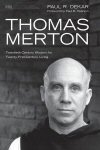
Thomas Merton was arguably the twentieth century’s most widely published and widely read spiritual writer. This book explores Merton’s prophetic writings and experiences as they offer guidance for spiritual seekers searching to experience God, to simplify their lives, to live more humanly, and to shape Christian community in the face of alienation, consumerism, noise, and technology. The book includes parts of three previously unpublished conference contributions by Merton on technology.
Paul Dekar presents us in this book with a manifesto for the future of the Christian community, which he sees being renewed by intentional, contemplative, essentially lay communities that know how to connect classic monastic wisdom with the challenges of our addicted-conflicted culture. He tells us with real passion that we don’t need to fight old battles, but instead need to focus on God’s future. The chapter on Merton and technology is alone worth the price of the book. Warmly recommended, especially to Christians discouraged with the institutional church.
—Donald Grayston, former president, International Thomas Merton Society
Paul Dekar’s book is a thoughtful and comprehensive summary of Merton’s concerns about our world—ranging from ecological consciousness, war, nonviolence, and technology to new monasticism and a dialogue with other faiths. It is a timely book offering real guidance. Thomas Merton’s diagnosis of the ills of our time is speaking powerfully still: ‘achievement neurosis,’ overspending, overwork, noise, violence, addiction to technology, and an individualism that has lost sight of the common good. The way forward? Creating ‘communities of love’ in which God’s presence and the depth of our humanity—which we consistently ignore—are experienced, and where the balance between the inner and the outer life can be restored.
—Miriam Michael Volpe, sister, Community of the Transfiguration
Paul R. Dekar is Niswonger Professor of Evangelism and Missions, Memphis Theological Seminary. He is author of Creating the Beloved Community: A History of the Fellowship of Reconciliation in the United States and Holy Boldness: Practices of an Evangelistic Lifestyle. He and his wife, Nancy, are North American members of Holy Transfiguration Monastery in Australia.
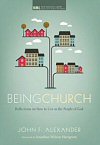
What modern church doesn’t call itself a “community”? Yet for how many is it real? How many churches form disciples intimately connected enough to call themselves Christ’s “body”? How many churches form disciples who know the relational arts that create a robust unity? How many form disciples practiced in the ways of sacrificial love?
Pastor John Alexander, a 30-year veteran of living in Christian communities, yearns for all the wonder and promise of the New Testament vision of church to come true. After struggling with Scripture in live-together church communities, he shares the scriptural practices and wisdom that make for an authentic, sustainable, and joyful life together. For any person or church wanting to move beyond the cliché of “community” to the radical vision of the New Testament, this book is an invaluable guide.
John Alexander has been one of the unsung heroes in the modern Christian world. His understanding of Christianity as a counter-cultural movement is profound, and he has been able to communicate it with effectiveness in his writings. Everything he has written has been marked by fresh insights into what it means to be a Christian in a society in which cultural Christianity has become the norm.
—Tony Campolo, emeritus professor of sociology, Eastern University
Superb. Disturbing. Challenging. Radical because it is biblical. Being Church is an extremely well-written, theologically profound but easily understood presentation of a hugely important truth: almost everything depends on recovering the revolutionary reality of genuine Christian community. A must-read.
—Ronald J. Sider, distinguished professor of theology, holistic ministry, and public policy, Palmer Theological Seminary
Being Church is a comprehensive and winsome invitation to embrace a more radical and holistic vision for the church. It is also a testament to the remarkable story of Church of the Sojourners. John’s voice has the weight of wisdom that comes only from deep reflection and hard-earned experience—it is a voice that we should pay attention to.
—Mark Scandrette, founding director, ReIMAGINE
It took a 60-year journey before John Alexander could write this book. Eventually he learned that trying harder and doing more is not the way God changes us. Nor is it the good news of the gospel for the world. This book shares the alternative: the culture of grace. It was worth the wait.
—Chris Rice, founding codirector, Center for Reconciliation, Duke Divinity School
John F. Alexander has been a teacher of philosophy and a columnist for The Other Side magazine. He is the author of Your Money or Your Life.
Reviews
2 ratings

Scott J Sherwood
5/23/2016
Nathan Long
10/15/2013